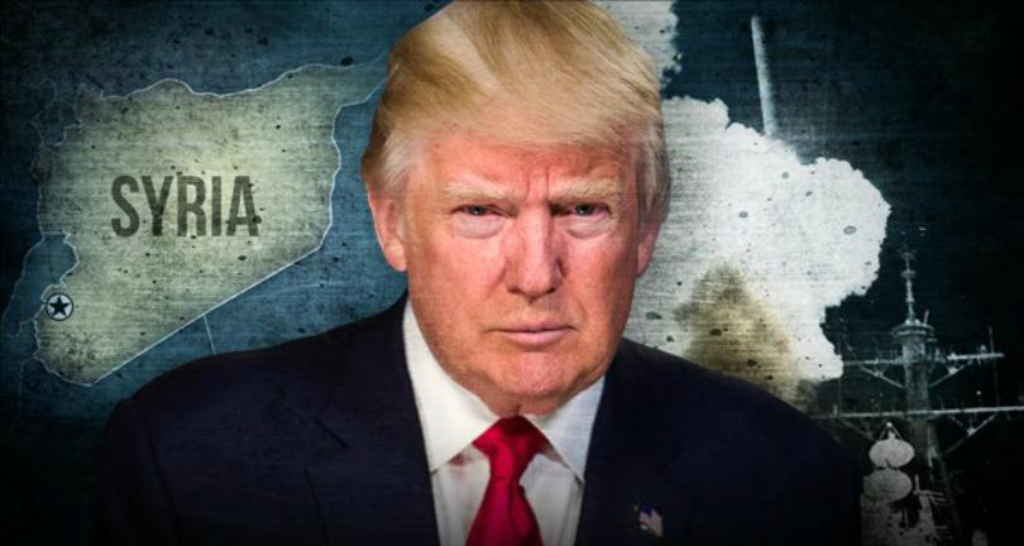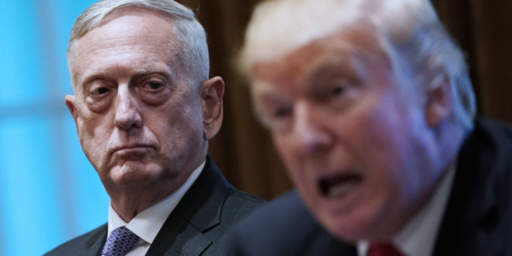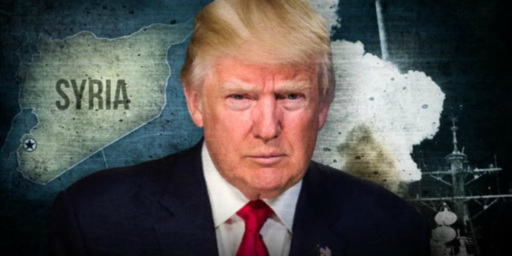Top Anti-ISIS Envoy Resigns Over Syria Withdrawal
President Trump has lost another one of his top advisers on the fight against ISIS.

In yet another sign of dissent from the President’s decision to withdraw American troops from Syria, the primary American liaison to the coalition fighting ISIS in Iraq and Syria has submitted his resignation:”
Brett McGurk, the special presidential envoy to the coalition fighting the Islamic State, has accelerated his resignation, telling colleagues this weekend that he could not in good conscience carry out President Trump’s newly declared policy of withdrawing American troops from Syria.
Mr. McGurk, a seasoned diplomat who was considered by many to be the glue holding together the sprawling international coalition fighting the terrorist group, was supposed to retire in February. But according to an email he sent his staff, he decided to move his departure forward to Dec. 31 after Mr. Trump did not heed his own commanders and blindsided America’s allies in the region by abruptly ordering the withdrawal of the 2,000 troops.
His decision comes right after the departure of Secretary of Defense Jim Mattis, whose own resignation letter was seen as a rebuke of the president’s actions in the region.
“The recent decision by the president came as a shock and was a complete reversal of policy that was articulated to us,” Mr. McGurk said in the email to his colleagues. “It left our coalition partners confused and our fighting partners bewildered,” he added.
“I worked this week to help manage some of the fallout but — as many of you heard in my meetings and phone calls — I ultimately concluded that I could not carry out these new instructions and maintain my integrity,” he said.
With more than a decade of experience in Iraq spanning three administrations, Mr. McGurk helped stitch together the 79-member coalition led by the United States, which oversaw the battle to take back cities from the terrorist group. He became special envoy in late 2015, during the Obama administration.
In a shift from the way the insurgency had been fought during the Bush administration, one of the Obama administration’s core doctrines was that America’s allies in the region needed to take the lead in recapturing territory, with American forces providing only air support and limited logistical assistance.
This meant that the ground war to take back key cities captured by the Islamic State, like Mosul in Iraq and Raqqa in Syria, took years to mount. And it came down to the 45-year-old McGurk to negotiate alliances and broker military aid to the mosaic of armed groups and governments vying for control of the region.
“To my mind, Brett had one of the hardest jobs in government,” said Nicholas Rasmussen, the former director of the National Counterterrorism Center. “His role demanded that he navigate the complexities of Iraqi politics and stitch together a diplomatic and military coalition of states with very divergent interests.”
At its height, the Islamic State controlled an area the size of Britain with a population estimated at 12 million people. Under Mr. McGurk’s guidance, the coalition succeeded in taking roughly half of the territory in the group’s self-declared caliphate by the time Mr. Trump took office in early 2017.
By the end of 2018, the Islamic State had lost all but 1 percent of the land it once held in Iraq and Syria, leading the White House to proclaim that the group had been defeated even though it is still estimated to have some 20,000 to 30,000 fighters in the region.
On Twitter, Mr. Trump did not directly address Mr. McGurk’s resignation but took credit for defeating the Islamic State.
“When I became President, ISIS was going wild,” he wrote. “Now ISIS is largely defeated and other local countries, including Turkey, should be able to easily take care of whatever remains.”
In fact, one of Mr. McGurk’s biggest challenges was securing the cooperation of Turkey.
Early on, it became clear that the only group in northern Syria capable of fighting the terrorist organization was a Kurdish militia. But brokering that alliance was tricky because of pushback from Turkey, which considers the Kurds in northern Syria to be an extension of the Kurdistan Workers’ Party, an outlawed separatist group that has been fighting a decades-long insurgency on Turkish soil.
After numerous meetings with senior Turkish officials who wanted to block any American involvement with the Syrian Kurds, Mr. McGurk’s team succeeded in negotiating an agreement. Only once that agreement was in full force did the coalition begin making strides against the militants.
That alliance saved American lives, coalition officials say. Four American soldiers died in the multiyear deployment to Syria, though the coalition estimates that the Kurds lost upward of 10,000 troops.
Mr. Trump had declared the defeat of the Islamic State in a tweet earlier this past week. Only days before, Mr. McGurk stood in front of reporters at a State Department briefing and promised that America was in the fight for the long haul.
“Nobody is declaring a mission accomplished. Defeating a physical caliphate is one phase of a much longer-term campaign,” he said. “I think it’s fair to say that Americans will remain on the ground after the physical defeat of the caliphate, until we have the pieces in place to ensure that that defeat is enduring.”
The Washington Post has more:
Brett McGurk, the U.S. envoy to the international coalition fighting the Islamic State, has resigned in protest of President Trump’s decision to abruptly withdraw U.S. troops from Syria.
His resignation, confirmed by a State Department official familiar with the matter, comes on the heels of Defense Secretary Jim Mattis’s announced departure earlier this week over differences with the White House over foreign policy, immediately following Trump’s decision. Mattis said he would stay on until February to ensure a smooth transition.
Both Mattis and McGurk objected to what they saw as shortsighted decision and a breach of faith with U.S. allies including the Syrian Kurds, who fought alongside U.S. forces in Syria and now face a dangerous and uncertain future.
For Trump, the long-serving government officials are the first high-profile departures in protest of his policy decisions.
McGurk’s departure is effective Dec. 31, an earlier exit than his intended departure in mid-February, the official said, speaking on condition of anonymity to discuss a personnel matter. McGurk submitted his resignation letter to Secretary of State Mike Pompeo on Friday, the official said.
The resignations send a negative signal to foreign partners whose support is crucial to containing Islamic State forces, said experts and former officials.
Earlier this month, McGurk said that the Islamic State was far from defeated despite its loss of territory. “Nobody working on these issues day to day is complacent. Nobody is declaring a mission accomplished,” McGurk said at a State Department briefing. “Defeating a physical caliphate is one phase of a much longer-term campaign.”
McGurk, who was appointed to the job in 2015 by President Barack Obama and retained by Trump, had long maintained that the U.S. mission in Syria should retain a disciplined focus on countering the Islamic State rather than wider regional ambitions such as the overthrow of Syrian President Bashar al-Assad, said diplomats who worked with him over the years.
In theory, his preference for a modest U.S. role was aligned with Trump’s view, but McGurk disagreed with the president’s assessment that the threat posed by Islamic State had been eliminated.
In recent months, McGurk’s preference for a limited U.S. mission was overruled by other Trump advisers, in particular, national security adviser John Bolton, who vowed in September that the United States now had new goal in Syria aimed at countering Iran’s influence. “We’re not going to leave as long as Iranian troops are outside Iranian borders and that includes Iranian proxies and militias,” he told reporters at the United Nations General Assembly in New York.
However, Trump this week ordered the withdrawal of all 2,000 or so U.S. troops from Syria and declared the Islamic State defeated. The move blindsided senior officials and ran counter to his own top aides’ advice, including that of Mattis.
“With the departures of folks like Secretary Mattis and Brett McGurk, you see indications that the experts felt so cut out of the process and so appalled by the decision that they simply couldn’t implement whatever the president’s vision is in a way that they could stomach, and so they chose to get out instead — in Brett’s case sooner than anticipated,” said Joshua Geltzer, who was White House counterterrorism senior director under Obama and is now a visiting professor at the Georgetown University Law Center.
For his part, President Trump claimed in a tweet last night that he had no idea who McGurk was:
Brett McGurk, who I do not know, was appointed by President Obama in 2015. Was supposed to leave in February but he just resigned prior to leaving. Grandstander? The Fake News is making such a big deal about this nothing event!
— Donald J. Trump (@realDonaldTrump) December 23, 2018
While McGurk had been serving in his position as the U.S. envoy to the anti-ISIS coalition since 2015, and it’s true that he was set to depart in February, but the idea that Trump had no idea who he was is fundamentally absurd. While I can’t find any evidence of it in a quick Google search, it’s almost certain that Trump had met McGurk at least once or twice over the course of the past two years. The fact that he’s now claiming to not even know the man shows how petty and insecure this President actually is.
In any case, McGurk made clear in his departing statement that he was leaving early for the same reason that Defense Secretary James Mattis because he vehemently disagreed with the decision to withdraw American ground forces from Syria. For McGurk, the matter no doubt hits closer to home given the fact that it was just two weeks ago that, contrary to the President, he stated in a speech that ISIS was most emphatically not defeated and that there remained as many as 20,000-30,000 ISIS-dedicated fighters in Iraq and/or Syria. Of course, in that regard it’s worth noting that the decision to withdraw from Syria does not impact the American forces in Iraq that are engaged in a similar training and advising mission with regard to ISIS, nor do they appear to impact that air support that the United States has been providing in both Iraq and Syria.
In any case, McGurk’s departure does emphasize one thing about the President’s Syria decision and that’s the fact that he doesn’t appear to have consulted any of his top aides or advisers before making the Syria decision, nor did he confer with any of our top allies in the anti-ISIS coalition. Indeed, the only foreign leader he appears to have discussed the matter with is Turkish President Recep Tayyip Erdogan, specifically a phone call between Erdogan and Trump on December 14th when Erdogan lobbied Trump to remove American forces from Syria. As many have noted, Erdogan has long seen the American troop presence, which is embedded with both Muslim Syrian rebels and Kurdish forces, as an impediment in his own desires to crush Kurdish forces in the area which threaten to fire up nationalist passions among Turkey’s own population of Kurds. According to these same reports, Erdogan promised Trump that if American forces withdrew from Syria, the Turks would take care of ISIS for us. It was apparently due to this phone call that, against the advice of Mattis, National Security Adviser John Bolton, and others, Trump decided to withdraw American forces from Syria. Notwithstanding the fact that I think we should withdraw from Syria, or at the very least that we should have never been there in the first place, the manner in which this President makes decisions of this import is concerning to say the least. Under these circumstances, it’s no surprise that people like Mattis and McGurk are choosing to step aside. If the President isn’t going to listen to their advice, then why bother sticking around?




Tiny suffers from the Dick Martin effect, “Blow in my ear and I’ll follow you anywhere.”
And in other news, Reuters reported last night that US troops in Japan are a barrier to Russia signing a peace treaty ending WWII hostilities. Expect Tiny to announce the troops withdrawal.
@Sleeping Dog: his advisors have had to talk Trump out of removing all our troops from South Korea on numerous occasions, so I wouldn’t be surprised.
I said before that even if entering Syria was a mistake, one cannot, or at the least, should not just leave.
there are alliances made for the conflict, long term plans, and other partners and allies involved, such as France and the UK. You just don’t take your ball and go home, and leave them out in the cold.
When you decide to leave, you talk to your allies and partners, you revise the plans, and set a time table for leaving. This is so elementary that I’m sure El Cheetos’s aides and advisers, like Mattis, Bolton, McGurk, and others must have raised the point. This is so elementary, too, that I can claim most reasonable people opposed to the US being in Syria would agree should be done.
This illustrates just how terrible Dennison is in his job, not to mention how terrible he is as a person.
Breaking: Trump has given Mattis the boot. Patrick Shanahan will be Acting SecDef as of January 1.
Obviously Trump couldn’t endure the praise Mattis was getting.
@CSK:
Trump was too fcking dumb to realize Mattis’ resignation letter was an outright attack on him. Now Fox News has ‘splained it to him, so naturally, he lashes out in as childish a way as possible. Weak, weak little man.
@CSK:
Ha! I was right. According to the NYTimes, Trump didn’t understand Mattis’s letter until someone read it and explained it to him.
@Teve:
Gee, I wonder if House Armed Services and Foreign Affairs committees will call him to testify publicly? Or, let me rephrase that: how will they decide who gets him first?
@CSK:
He’s a tiny, insecure, petty excuse for a human being.
But, I wonder whether he realizes he looks worse, not better, when he does stunts like this. The assumption is he does not, and that’s why he keeps doing it. but it’s not so simple. he may be fully aware, but do it anyway. If that’s the case, he’s even worse as a person than I thought.
@Michael Reynolds: @Teve:
Didn’t see these till I’d finished typing. So…who explained it to him? Hannity?
@Kathy:
I think he thinks it makes him look tough and strong and decisive to his moronic fan club.
@CSK: Probably does make him look strong to the fanboiz. Nevertheless, Trump has a point. First, McGurk is a holdover from Obama, thereby making him part of the *deep state* opposition that has been undermining the Administration since even before Day 1. Beyond that, if we’re not going to have troops there, his job is over anyway so leaving now is not a problem. Moreover, if the coalition has routed ISIS, that coalition is now obsolete and should be allowed to reform as the group it will need to be in the future. Finally, Trump is clearly the only person in the entire United States who sees all of these disparate elements clearly and has the wisdom, from “the shows” to pursue the correct wind down. MAWA!
@CSK: if it was hannity, who explained it to hannity first? 😀
@Just nutha ignint cracker:
Well, over at Breitbart, they’re cheering the dismissal of the “globalist bastard.”
@Teve:
Ingraham, one supposes.
Absurd though it is, I suspect it might be true.
Donald J. Trump is not what we would call a detail-oriented man.